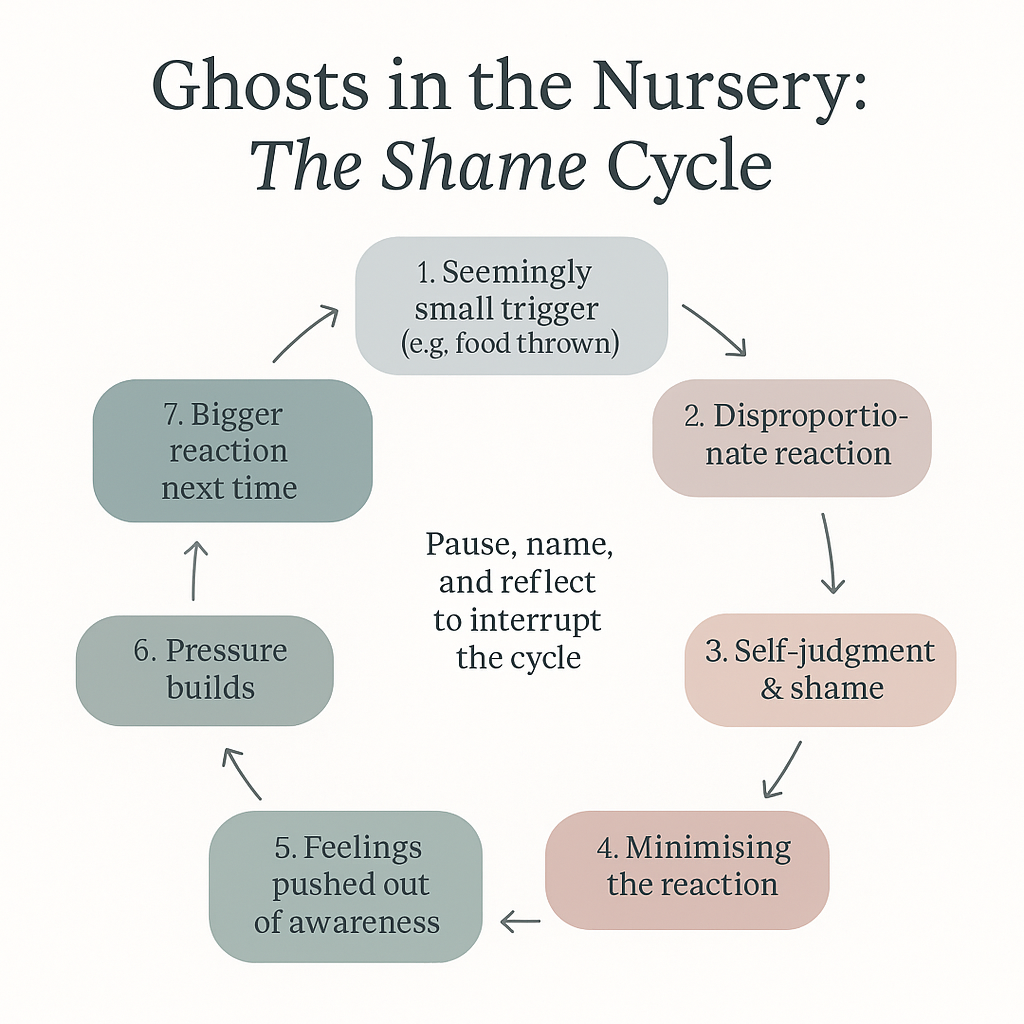Ghosts in the Nursery: Breaking Generational Cycles in Parenting
It’s early morning. You’ve been up since 5am, after waking three more times in the night with your 9-month-old. Still, you’ve been giggling together over breakfast - until she gets overexcited and flings a fistful of porridge across the room. It lands on the wall, the cat, and your favourite slippers.
In an instant, the feelings of contentment you were enjoying just a moment ago melt away. Your chest tightens, your heart rate spikes, your shoulders tense. Anger bubbles up, sudden and unwelcome, and you feel on the verge of snapping.
You manage to step away, take a breath, and calm yourself down, putting it down to sleep deprivation. But later you notice that you’ve been here before: you can handle many challenging moments as a parent, yet wasting or refusing food seems to stir something deeper.
As you clean up, a vivid memory surfaces - sitting at the dinner table as a child, terrified as your Dad raged over your reluctance to clear your plate. You remember his words about how much money he spent on your meals, the sting of being called ungrateful. The shame, fear, and indignation you felt then seem to echo in the present moment.
Psychologists Selma Fraiberg, Edna Adelson, and Vivian Shapiro described this phenomenon in 1975 as “ghosts in the nursery” — unprocessed experiences from our own childhoods that quietly visit us in our parenting. They may be the voices, patterns, or silences we grew up with, replayed in ways we might not notice until they catch us off-guard.
How Ghosts Show Up
Unfortunately, it’s not often as easy to unearth the childhood experience behind our patterns of behaviour as in the example above. Ghosts rarely announce themselves, but they usually can’t help but slip into the room through our reactions, such as:
Over- or underreacting to our child’s distress because our distress was consistently ignored, or nurtured only intermittently;
Struggling to set boundaries because we grew up with caregivers who were authoritarian and unyielding;
Keeping others at arm’s length because emotional intimacy once felt unsafe or impossible to come by;
Struggling to identify, manage, or express our own emotions because we were raised in an environment where there was no space for our feelings, no modelling of emotional literacy;
Suffering from low self-esteem and becoming overly perfectionistic or critical, because we were raised to never feel “good enough”.
These scars – ones we’re aware of, and ones that aren’t yet accessible to the conscious mind - can lead to ‘emotional time-travel’. Suddenly, we’re no longer the adult in the room, but the child we once were.
The Weight They Carry
When ghosts are active, our responses can feel confusing even to ourselves. We might think, “Why did I react like that?” or “That felt bigger than it should have.”
This isn’t a moral failing, it’s a human one. Our nervous systems remember experiences even when our conscious minds have long since moved on.
If we’re not aware of it, it can be all-too-easy to fall into a cycle of shame:
K Davison, 2025
Seemingly Small Trigger
An everyday parenting challenge occurs (e.g., toddler throws food).Disproportionate Emotional Reaction
Strong anger, irritation, or distress surfaces that feels “bigger” than the situation.Self-Judgment and Shame
You feel bad for reacting so strongly — shame, sadness, or self-disgust creep in.Minimising or Dismissing the Reaction
You tell yourself “It’s not a big deal” or push away the feelings.Further Repression of Feelings and Memories
The original emotions — and any linked memories from your own childhood — are pushed further out of awareness.Emotional Pressure Builds
Anger, shame, and frustration accumulate beneath the surface.Escalated Reaction Next Time
A similar trigger prompts an even stronger response, and the cycle continues.
Breaking the Cycle
‘Doing better’ doesn’t mean perfect parenting. Donald Winnicott’s concept of the ‘good enough mother’ (now applied to all parents) reminds us that perfection isn’t the goal. Small moments of rupture—missed cues, such as being busy making dinner and asking your child to wait—can actually help build a child’s resilience. These moments show them that nothing catastrophic happens if they are not responded to instantly. This is only true, however, when the overall attachment is secure, parenting is generally responsive and consistent, and ruptures are repaired through reconnection as soon as possible.
Some starting points:
Noticing without judgement — recognising when the past might be intruding on the present.
Making sense of your story — through therapy, self-reflection, journaling, or honest conversations with those you trust.
Forgiving and coming alongside yourself as you choose to do differently
Practising a new response — staying present with your child’s needs, even if it feels uncomfortable.
Seeking support — friends, partners, or professionals who can “hold” you as you hold your child.
Every time we pause and choose a new response, we loosen the grip of the past.
If you do find yourself ‘losing it’ with your child, self-soothing and repair are essential. Effective repair involves a balanced level of emotional vulnerability that’s appropriate for your child’s developmental age and stage. For a preverbal infant, this may mean lots of cuddles, kisses, and attentive 1:1 play to help them regulate. For a three-year-old, it might include a simple apology and reassurance, such as: “Mummy/Daddy got cross, but it’s not your fault. I love you very much.”
Angels in the Nursery
Fraiberg’s work also points to this hopeful concept – these are the positive, nurturing moments that help us stay present and connected. This might have been from a teacher who made you feel safe, a grandparent who listened without judgement, or a partner who supports and uplifts you.
These experiences can help us counteract the imperfect parenting we may have received. This is where therapy comes in, as it can offer a compassionate space to:
Notice and name ghosts without fear of judgement or reproach
Understand how they influence your parenting and the impact on your family
Develop new ways of responding that feel aligned to your values
Model a positive, nurturing relationship and strengthen the ‘angels’
This work isn’t about blaming your parents — or yourself. It’s about making sense of the invisible threads between past and present, so you can parent with more choice, connection, and ease.
An Invitation to Reflect
If this resonates, you might take a quiet moment to consider:
When do I feel most triggered as a parent?
What echoes from my past do I notice in those moments?
What helps me feel grounded and present with my child?
The ghosts may be part of your story, but they don’t have to write the next chapter.
If you’d like a safe space to explore your own ‘nursery’ — ghosts, angels, and everything in between — I offer therapy sessions for parents who want to deepen their self-understanding and strengthen their connections with their children.

